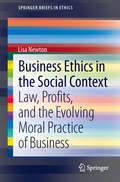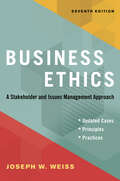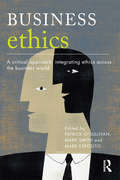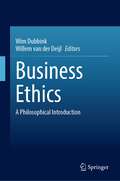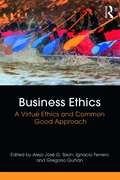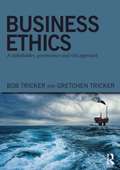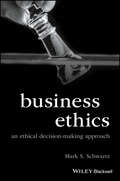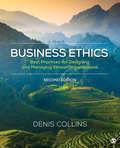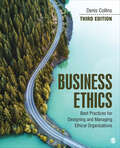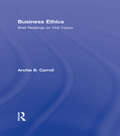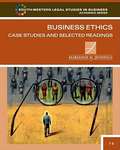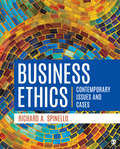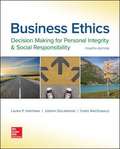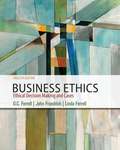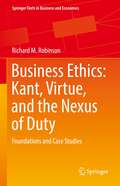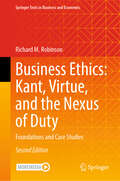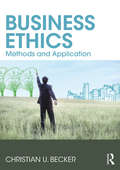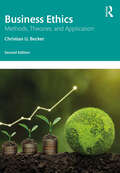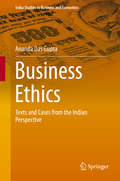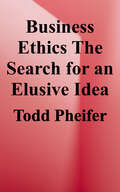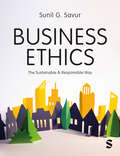- Table View
- List View
Business Ethics in the Social Context: Law, Profits, and the Evolving Moral Practice of Business (SpringerBriefs in Ethics)
by Lisa NewtonThe book tracks the rise of Business Ethics as a discipline in the United States through a review of the basic understandings of the role of business practices in the operations of society, beginning with Aristotle and proceeding to a review of the formative concepts and cases in the history of American business.
Business Ethics, Seventh Edition: A Stakeholder and Issues Management Approach
by Joseph W. WeissThe seventh edition of this pragmatic guide to determining right and wrong in the workplace is updated with new case studies, exercises, and ancillary materials.Joseph Weiss's Business Ethics is a pragmatic, hands-on guide for determining right and wrong in the business world. To be socially responsible and ethical, Weiss maintains, businesses must acknowledge the impact their decisions can have on the world beyond their walls. An advantage of the book is the integration of a stakeholder perspective with an issues and crisis management approach so students can look at how a business's actions affect not just share price and profit but the well-being of employees, customers, suppliers, the local community, the larger society, other nations, and the environment. Weiss includes twenty-three cases that immerse students directly in contemporary ethical dilemmas. Eight new cases in this edition include Facebook's (mis)use of customer data, the impact of COVID-19 on higher education, the opioid epidemic, the rise of Uber, the rapid growth of AI, safety concerns over the Boeing 737, the Wells Fargo false saving accounts scandal, and plastics being dumped into the ocean. Several chapters feature a unique point/counterpoint exercise that challenges students to argue both sides of a heated ethical issue. This edition has eleven new point/counterpoint exercises, addressing questions like, Should tech giants be broken apart? What is the line between free speech and dangerous disinformation? Has the Me Too movement gone too far? As with previous editions, the seventh edition features a complete set of ancillary materials for instructors: teaching guides, test banks, and PowerPoint presentations.
Business Ethics: A Critical Approach: Integrating Ethics Across the Business World
by Mark Smith Mark Esposito Patrick O’SullivanEvents such as Trafigura's illegal dumping of toxic waste in Côte d’Ivoire and BP's environmentally disastrous oil spill in the Gulf of Mexico have highlighted ethical issues in international business at a time when business leaders, academics and business schools were reflecting on their own responsibilities following the global financial crisis. The scope and scale of the global operations of multinational businesses means that decisions taken in different parts of the world have far reaching consequences beyond the national settings where employees are located or where firms are registered and as such, an awareness of these responsibilities needs to be integrated into all levels and all subjects. Using four guiding principles – a critical multi-level approach rooted in the tradition of European social theory, a comparative and international perspective, a global rather than just a European or American stand point and engaging with subject-specific issues this book aims to 'mainstream' business ethics into the work of teachers and students in business schools. This comprehensive volume brings together contributions from a range of experts in different areas of business studies thereby facilitating and encouraging a move away from business ethics being a box to be ticked to being an integrated consideration across the business disciplines. This impressive book brings ethical considerations back to the heart of the business curriculum and in doing so, provides a companion for the progressive business student throughout their university career.
Business Ethics: A Kantian Perspective
by Norman E. BowieThis book provides essential reading for anyone with an academic or professional interest in business ethics today.
Business Ethics: A Philosophical Introduction
by Wim Dubbink Willem van der DeijlThis textbook not only provides the student with a solid foundation in ethics, but introduces students to the most important themes relevant to business today. Issues such as human rights violation down in the supply chain, the effect business has on nature and the environment, and inclusiveness are each discussed in separate chapters, which discuss their importance, but also their challenges. While there are numerous business ethics textbooks, few take a philosophical approach to business ethics. However, without introducing philosophical ethics, discussions about business ethics are bound to get stuck in fallacies and paradoxes. This textbook therefore fills an important societal gap by providing an introduction to profound philosophical issues in clear language at a philosophically high, but accessible level.
Business Ethics: A Virtue Ethics and Common Good Approach
by Ignacio Ferrero Alejo José Sison Gregorio GuitiánCan business activities and decisions be virtuous? This is the first business ethics textbook to take a virtue ethics approach. It explains how virtue ethics compares with alternative approaches to business ethics, such as utilitarianism and deontology, and argues that virtue ethics best serves the common good of society. Looking across the whole spectrum of business—including finance, governance, leadership, marketing and production—each chapter presents the theory of virtue ethics and supports students’ learning with chapter objectives, in-depth interviews with professionals and real-life case studies from a wide range of countries. Business Ethics: A Virtue Ethics and Common Good Approach is a valuable text for advanced undergraduates and masters-level students on business ethics courses.
Business Ethics: A stakeholder, governance and risk approach
by Bob Tricker Gretchen TrickerTraditionally, books on business ethics focus on CSR, companies’ relations with their stakeholders, and corporate citizenship. More recently, green credentials and sustainability have been added to that agenda. Unconventionally, this book argues that business ethics are basic to running business, not a separate subject. They are inherent to the governance and management of every organization, not an optional exercise in corporate citizenship. Business ethics concern behaviour in business and the behaviour of business. Decisions at every level in a company have ethical implications – strategically in the board room, managerially throughout the organization, and operationally in all of its activities. The use, and sometimes the abuse, of corporate power, the process of corporate governance, raises ethical issues. Business involves risk-taking, whether decisions are at the strategic, managerial, or operational level. Exposure to ethical risk needs to be part of every organization’s strategy formulation, policy making, and enterprise risk management. Designed to be read by both undergraduates and postgraduates, this book is a primer on ethics in business. It is also relevant to ethics courses that are now part of many legal, accountancy and other professional examinations. The book is not about moral philosophy, nor does it prescribe appropriate standards of behaviour or recommend economic, legal or political solutions. Rather it enables readers to recognize ethical issues in business, to respond appropriately, and to embed ethics in business processes. The book not only considers what business ethics are, and why they are important, but offers practical approaches on how to develop a successful corporate ethics culture.
Business Ethics: An Ethical Decision-Making Approach (Foundations of Business Ethics)
by Mark S. SchwartzBusiness Ethics: An Ethical Decision-Making Approach presents a practical decision-making framework to aid in the identification, understanding, and resolution of complex ethical dilemmas in the workplace. Focuses exclusively on three basic aspects of ethical decision making and behavior—how it actually takes place, how it should take place, and how it can be improved Uses real-life examples of moral temptations and personal ethical dilemmas faced by employees and managers Discusses the biases, psychological tendencies, moral rationalizations, and impact of self-interest as impediments to proper ethical decision making Includes relevant examples of ethical misconduct and scandals appearing in the news media
Business Ethics: Best Practices for Designing and Managing Ethical Organizations
by Denis CollinsBusiness Ethics: Best Practices for Designing and Managing Ethical Organizations, Second Edition focuses on how to create organizations of high integrity and superior performance. Author Denis Collins shows how to design organizations that reinforce ethical behavior and reduce ethical risks using his unique Optimal Ethics Systems Model that outlines how to hire and train ethical employees, make ethical decisions, and create a trusting, productive work environment. Taking a practical approach, this text is packed with tips, strategies, and real-world case studies that profile a wide variety of businesses, industries, and issues. New to This Edition: Premium Ethical Dilemma videos located in the Interactive eBook challenge students to practice their ethical reasoning and ethical decision-making skills. New case studies tackle complex ethical issues through real-world companies such as the NFL, Wells Fargo, Exxon Mobil, and Volkswagen. New chapter-opening ethical dilemmas based on real situations allow students to grapple with the grey areas of business ethics. Optimal Ethics System Check-Up surveys summarize the best practices discussed in the chapter to allow students to assess, benchmark, and continuously improve their own organization. Ethics in the News activities profile real-world events such as United Airlines’ removal of a passenger on an overbooked flight to challenge students to think critically about how they would respond in a particular situation. Up for Debate features highlight contentious issues that students encounter in real life (such as Facebook privacy).
Business Ethics: Best Practices for Designing and Managing Ethical Organizations
by Denis CollinsBusiness Ethics: Best Practices for Designing and Managing Ethical Organizations, Second Edition focuses on how to create organizations of high integrity and superior performance. Author Denis Collins shows how to design organizations that reinforce ethical behavior and reduce ethical risks using his unique Optimal Ethics Systems Model that outlines how to hire and train ethical employees, make ethical decisions, and create a trusting, productive work environment. Taking a practical approach, this text is packed with tips, strategies, and real-world case studies that profile a wide variety of businesses, industries, and issues. New to This Edition: Premium Ethical Dilemma videos located in the Interactive eBook challenge students to practice their ethical reasoning and ethical decision-making skills. New case studies tackle complex ethical issues through real-world companies such as the NFL, Wells Fargo, Exxon Mobil, and Volkswagen. New chapter-opening ethical dilemmas based on real situations allow students to grapple with the grey areas of business ethics. Optimal Ethics System Check-Up surveys summarize the best practices discussed in the chapter to allow students to assess, benchmark, and continuously improve their own organization. Ethics in the News activities profile real-world events such as United Airlines’ removal of a passenger on an overbooked flight to challenge students to think critically about how they would respond in a particular situation. Up for Debate features highlight contentious issues that students encounter in real life (such as Facebook privacy).
Business Ethics: Best Practices for Designing and Managing Ethical Organizations
by Denis Collins Patricia KanashiroBusiness Ethics teaches students how to create organizations of high integrity and superior performance. Author Denis Collins and new co-author Patricia Kanashiro walk readers through designing ethical organizations using an Ethical Systems Model that outlines best practices for hiring, training, making ethical decisions, and fostering trust. The substantially revised Third Edition integrates the most current research findings; includes three new chapters on corporate governance and stakeholder relationships, global sustainability, and global corporate citizenship; and explores timely topics through new case studies on the opioid crisis, the #MeToo movement, climate change, and business responses to the COVID-19 pandemic. This title is accompanied by a complete teaching and learning package. Contact your SAGE representative to request a demo. Digital Option / Courseware SAGE Vantage is an intuitive digital platform that delivers this text’s content and course materials in a learning experience that offers auto-graded assignments and interactive multimedia tools, all carefully designed to ignite student engagement and drive critical thinking. Built with you and your students in mind, it offers simple course set-up and enables students to better prepare for class. Assignable Video with Assessment Assignable video (available with SAGE Vantage) is tied to learning objectives and curated exclusively for this text to bring concepts to life. Watch a sample "What Would You Do?" video. Assignable Self-Assessments Assignable self-assessments (available with SAGE Vantage) help students evaluate the ethics of an organization or group that they are a part of. LMS Cartridge: Import this title’s instructor resources into your school’s learning management system (LMS) and save time. Don’t use an LMS? You can still access all of the same online resources for this title via the password-protected Instructor Resource Site. Learn more.
Business Ethics: Best Practices for Designing and Managing Ethical Organizations
by Denis Collins Patricia KanashiroBusiness Ethics teaches students how to create organizations of high integrity and superior performance. Author Denis Collins and new co-author Patricia Kanashiro walk readers through designing ethical organizations using an Ethical Systems Model that outlines best practices for hiring, training, making ethical decisions, and fostering trust. The substantially revised Third Edition integrates the most current research findings; includes three new chapters on corporate governance and stakeholder relationships, global sustainability, and global corporate citizenship; and explores timely topics through new case studies on the opioid crisis, the #MeToo movement, climate change, and business responses to the COVID-19 pandemic. This title is accompanied by a complete teaching and learning package. Contact your SAGE representative to request a demo. Digital Option / Courseware SAGE Vantage is an intuitive digital platform that delivers this text’s content and course materials in a learning experience that offers auto-graded assignments and interactive multimedia tools, all carefully designed to ignite student engagement and drive critical thinking. Built with you and your students in mind, it offers simple course set-up and enables students to better prepare for class. Assignable Video with Assessment Assignable video (available with SAGE Vantage) is tied to learning objectives and curated exclusively for this text to bring concepts to life. Watch a sample "What Would You Do?" video. Assignable Self-Assessments Assignable self-assessments (available with SAGE Vantage) help students evaluate the ethics of an organization or group that they are a part of. LMS Cartridge: Import this title’s instructor resources into your school’s learning management system (LMS) and save time. Don’t use an LMS? You can still access all of the same online resources for this title via the password-protected Instructor Resource Site. Learn more.
Business Ethics: Brief Readings on Vital Topics
by Archie B. CarrollThese readings grew out of the author's monthly column on business ethics in the business section of the Athens Banner-Herald newspaper. Written in an open and engaging style, the book features topics that are timely, each followed by several thought provoking discussion questions. The book includes readings on the current financial crisis in order to challenge today's students to confront the economic reality in which they will have to live. An excellent addition to any Business Ethics course.
Business Ethics: Case Studies and Selected Readings (7th Edition)
by Marianne M. JenningsPacked with real-life examples of business decisions gone awry, the 7th Edition of BUSINESS ETHICS: CASE STUDIES AND SELECTED READINGS explores the complex issues of business ethics from the leaders' perspectives. This best-selling text offers a rare collection of readings which examines the business decision-making processes of many types of leaders, while revealing some of the common factors that push them over ethical lines they might not otherwise cross. A combination of short and long cases, readings, hypothetical situations, and current ethical dilemmas, BUSINESS ETHICS: CASE STUDIES AND SELECTED READINGS provides a stimulating and thorough basis for evaluating business ethics, and encourages stronger values in future business leaders.
Business Ethics: Contemporary Issues and Cases
by Richard A. SpinelloThe future of the free market depends on fair, honest business practices. Business Ethics: Contemporary Issues and Cases aims to deepen students’ knowledge of ethical principles, corporate social responsibility, and decision-making in all aspects of business. The text presents an innovative approach to ethical reasoning grounded in moral philosophy. Focusing on corporate purpose—creating economic value, complying with laws and regulations, and observing ethical standards—a decision-making framework is presented based upon Duties-Rights-Justice. Over 40 real-world case studies allow students to grapple with a wide range of moral issues related to personal integrity, corporate values, and global capitalism. Richard A. Spinello delves into the most pressing issues confronting businesses today including sexual harassment in the workplace, cybersecurity, privacy, and environmental justice.
Business Ethics: Contemporary Issues and Cases
by Richard A. SpinelloThe future of the free market depends on fair, honest business practices. Business Ethics: Contemporary Issues and Cases aims to deepen students’ knowledge of ethical principles, corporate social responsibility, and decision-making in all aspects of business. The text presents an innovative approach to ethical reasoning grounded in moral philosophy. Focusing on corporate purpose—creating economic value, complying with laws and regulations, and observing ethical standards—a decision-making framework is presented based upon Duties-Rights-Justice. Over 40 real-world case studies allow students to grapple with a wide range of moral issues related to personal integrity, corporate values, and global capitalism. Richard A. Spinello delves into the most pressing issues confronting businesses today including sexual harassment in the workplace, cybersecurity, privacy, and environmental justice.
Business Ethics: Decision Making for Personal Integrity and Social Responsibility (Fourth Edition)
by Laura P. Hartman Chris MacDonald Joe DesJardinsThis textbook provides a comprehensive introduction to the ethical issues arising in business. It focuses on real-world ethical decision making at both the personal and policy levels and provides students with a decision-making process that can be used in any situation.
Business Ethics: Ethical Decision Making And Cases (Mindtap Course List)
by Linda Ferrell O. C. Ferrell John FraedrichThis textbook is designed to help students improve their ability to make ethical decisions in business by providing them with a framework they can use to identify, analyze, and resolve ethical issues in business decision making. The text has been revised throughout, and new data and examples added,
Business Ethics: Foundations and Case Studies (Springer Texts in Business and Economics)
by Richard M. RobinsonThis book offers students a philosophical introduction to the ethical foundations of business management. It combines lessons from Kant with virtue ethics and also touches upon additional approaches such as utilitarianism. At the core of the book lies the concept of the nexus of imperfect managerial duty: building and reinforcing the virtuous managerial team, engaging in reasoned discourse among all stakeholders, and diligently pursuing business responsibilities, including the creative efforts necessary for modern organizations.Case illustrations of these applications are presented throughout the book, including chapter appendices. Ancillary videos, test and answer banks and sample syllabi are available online via the author’s website.
Business Ethics: Foundations and Case Studies (Springer Texts in Business and Economics)
by Richard M. RobinsonThis book offers students a philosophical introduction to the ethical foundations of business management. It combines lessons from Kant with virtue ethics and also touches upon additional approaches such as utilitarianism. At the core of the book lies the concept of the “nexus of imperfect managerial duty.” This consists of the creation and reinforcement of virtuous managerial teams, engagement of discourse among all stakeholders, and pursuit of business responsibilities including the creative efforts necessary for modern organizations. A variety of special problems in managerial ethics are also explored, such as the ethics of managerial paternalism, fairness in stakeholder negotiations, devolution of business into scandalous corruption, and the role of boycotts in society’s shaping of managerial duties. Case illustrations of these applications are presented throughout the book including in chapter appendices. A series of brief-answer questions, essay questions, and discussion questions are presented at the end of each chapter. Links to relevant video presentations of lectures applicable for each chapter are also provided.
Business Ethics: Methods and Application
by Christian U BeckerEthical aspects of business and the economy are of increasing concern in business practice, higher education, and society in general. This concern results from significant business scandals and economic crises, such as the financial crisis of 2008 and the following great recession, as well as from pressing current and future challenges for the economy, such as sustainability and globalization. As a result, there is a growing demand for normative analysis and orientation for business and the economy, where business ethics has become a crucial part of organizational management, risk management, branding, and strategic management. Business Ethics: Methods and Application provides a new systematic approach to normative business ethics that covers the complex and various ethical challenges of modern business. It aims to train analytical thinking skills in the field of business ethics and to approach ethical issues in business in a rational and systematic way. The book develops a number of specific methods for business ethics analysis that are tailored for ethical decision-making in business and for analyzing complex ethical topics in business. The book discusses fundamental ethical questions regarding the meaning of business and the economy for the individual person, society, the environment, and people around the world. As a result, Business Ethics: Methods and Application develops normative guidelines for business in the 21st century and its fundamental challenges and will be key reading for undergraduate, postgraduate, and MBA students of business ethics, business strategy, business and society, and related fields.
Business Ethics: Methods, Theories, and Application
by Christian U. BeckerBusiness Ethics: Methods, Theories, and Application provides a new systematic approach to normative business ethics that covers the complex and various ethical challenges of modern business. It aims to train analytical thinking skills in the field of business ethics and to approach ethical issues in business in a rational and systematic way.The book develops a number of specific methods for business ethics analysis that are tailored for ethical decision-making in business and for analyzing complex ethical topics in business. The book discusses fundamental ethical questions regarding the meaning of business and the economy for the individual person, society, the environment, and people around the world.As a result, Business Ethics: Methods, Theories, and Application develops normative guidelines for business in the 21st century and its fundamental challenges and will be key reading for undergraduate, postgraduate, and MBA students of business ethics, business strategy, business and society, and related fields.This second edition is fully updated to recognize the changing nature of ethics and corporate responsibility in a globalized world and includes online support material.
Business Ethics: Texts and Cases from the Indian Perspective (India Studies in Business and Economics)
by Ananda Das GuptaBusiness ethics is understood in a comprehensive and differentiated sense, as in recent years it has evolved under the influence of globalization. The present book examines inclusive growth, which includes more than just poverty alleviation and seeks to address the problem of equity through the enhancement of opportunities for all parties. This conforms to the fundamental task of business ethics, which is to enhance the ethical quality of decision-making and actions taken at all levels of business, i. e. , at the personal (micro-), organizational (meso-), and systemic (macro-) levels and thus extending the narrow notion of business ethics as a niche for managers with good intentions. In the real world of competition and coordination, various situations produce various tradeoffs that the three pillars of the economy, i. e. , Business, Government and Society have to pursue for their survival and sustenance. In this book, we look into many such case studies in which the strength of one component leads to a benefit for one of the other components and a detriment for the other, thus causing an imbalance between the three pillars. This book will be equally valuable to students, philosophers, decision-makers in business and policy-makers at large.
Business Ethics: The Search for an Elusive Idea
by Todd PheiferFeaturing a conversational and highly approachable tone, Business Ethics: The Search for an Elusive Idea helps students bridge the gap between the complicated subject matter of ethics and the practical, everyday business situations in which ethics can come into play. <p><p>Opening chapters provide students with a broad overview of philosophy, ethics, business, and human motivation. Students develop their vocabulary and general understanding of concepts and constructs related to ethics. Additional chapters examine a number of societal areas that have been the subject of ethical scrutiny in the past through a collection of engaging case studies. <p><p>The studies discuss the housing crisis, the cost of health care, deception and trickery in advertising, and issues related to the auto industry and big oil. Closing chapters provide students with guidelines for organizational direction and advice for developing measurable change over time.
Business Ethics: The Sustainable and Responsible Way
by Sunil G SavurBusiness Ethics: The Sustainable and Responsible Way provides a fresh, contemporary, and hands-on approach to business ethics, emphasizing practical skills. This practical approach is supported through a rich array of short and long case studies from across the globe, including countries such as the UK, Australia, the US, India, China, Nigeria and Ghana. Cases feature companies such as Patagonia, the Aravind Eye Clinic, Merck and LEGO and examine topics such as the gig economy, fast fashion, electric vehicles, artificial intelligence, and space exploration. Accompanying questions also encourage reflection and the skills needed to apply theory to real-life scenarios. This textbook is suitable for undergraduate and postgraduate students of business ethics, as well as those studying business and society, corporate social responsibility, sustainability, and responsible management. Online resources include PowerPoint slides and a Teaching Guide. Dr Sunil G. Savur is a Business Ethics lecturer and researcher at the University of South Australia, Adelaide.
